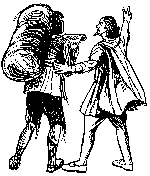
Many stars shine brightly in the sky of Augustus Toplady's hymn writing. "As debtors to mercy alone, of Covenant mercy I sing," is a hymn that has a lustre almost beyond compare to cheer the darkest hour of the humblest saint – and especially the concluding verse that speaks of our security on earth as being every bit as secure as our security in heaven:
"A Sovereign Protector I have" is a true and steadfast guiding light to the pilgrim's path, while, "From whence this fear and unbelief" sits glowing in the heavens pointing us to the sure and certain hope of the believer chosen in Christ from the foundation of the world and purchased unto everlasting life by the blood of the Redeemer:
And yet, it goes without saying, almost, that Toplady's "Rock of Ages" far outshines the rest in a sky full of gems.
The source of Toplady's great hymn is open to some speculation. The story goes that one day, when overtaken by a thunderstorm on Burrington Coombe, Toplady hid for shelter in the great rock which still stands in that place and was reminded of the place of refuge that he, as a believer, had in the riven side of Christ. Others believe that he gleaned the idea from reading a sermon of Daniel Brevint's where the words are cried out in prayer – "O Rock of Israel, Rock of salvation, Rock struck and cleft for…" etc. Perhaps, it was a combination of both. But, whatever the earthly source, we may be soundly persuaded that Toplady drew his images and figures from the very Word of God itself for "The Lord Jehovah…The Rock of Ages" is the very language of Scripture and the theme of our salvation.
The hymn points us to the two great needs of the sinner as he comes to view himself in the light of God's justice – shelter from God's wrath and cleansing from his own sin. There is only one spot that he may find these necessities of redemption and that is in the eternal Rock of Ages:
Blessed thought that, "the double cure." Let us never forget that the gospel of Christ is not only a refuge, but a hospital, as well. Not only a sanctuary where the guilty hell-deserving sinner may flee to escape the "wrath of a sin-hating God" – as Toplady puts it in another hymn – but a place of cleansing; so that we are not only saved from the penalty of sin, but are being cleansed from the power of sin. Not only justified, but also sanctified. Not only forgiven by the great Judge of all the earth, but attended to by the Great Physician of our souls. In the cleft of the Rock, which is Christ the Lord, there is, indeed, a "double cure" for all ills.
And "Neither is there salvation in any other," our author seems to be reminding us in his second verse:
All our works, all our zeal, all our tears on one side of the scales of eternal justice; by God's Holy Law on the other – and we stand condemned. And if the sinner is ever going to be saved, then "Thou must save, and Thou alone."
Now, when Toplady wrote those words, he meant them. He didn't belong to that school who say that they believe that God must save the sinner and then tell the sinner that it all depends on him.
Toplady was an unapologetic Calvinist for he knew that the day of his salvation – when he had wandered into a country barn in Ireland and had been struck down in his conscience by an illiterate evangelist – was the Lord's doings and wondrous in his eyes. He was absolutely destitute of any saving merit, just as he is yet, apart from Christ:
Toplady has often been accused by literary men of using too many mixed metaphors – the refuge, the washing, the clinging, the fleeing. But there is another language - the language of Canaan – that far transcends any such analysis and it is that language that is to the forefront here. The awakened sinner sinking in the sea of condemnation sees that there is nothing else to lay hold of but the cross of Christ rising out of the waters on a solid rock. There is no other covering for his nakedness but the robe of Christ's righteousness. There is nothing short of God's unmerited grace to meet his helplessness, and there is no other fountain to wash away his foulness than that which was open on that day for sin and for uncleanness.
And at the hour of death, there is still but one place of safety for the believing soul:
Augustus Toplady died at the young age of thirty-eight; but he died as he lived, with praise in his mouth. "I enjoy heaven already in my soul," he whispered.
May we learn in our day that our safety is in the Rock that was cleft for us and not in anyway in our own merits. "A believer never yet carved for himself," Toplady told his own mother, "but he cut his own finger." Learn, I say, that it is "all of grace" and then, we shall praise Him now and in eternity. "O my dove, that art in the cleft of the rock … let me see thy countenance, let me hear thy voice; for sweet is thy voice, and thy countenance is comely."

This Page Title – Great Hymns and their Writers – "Rock of Ages" written by Augustus Toplady The Wicket Gate Magazine "A Continuing Witness". Internet Edition number 71 – placed on line March 2008 Magazine web address – www.wicketgate.co.uk |